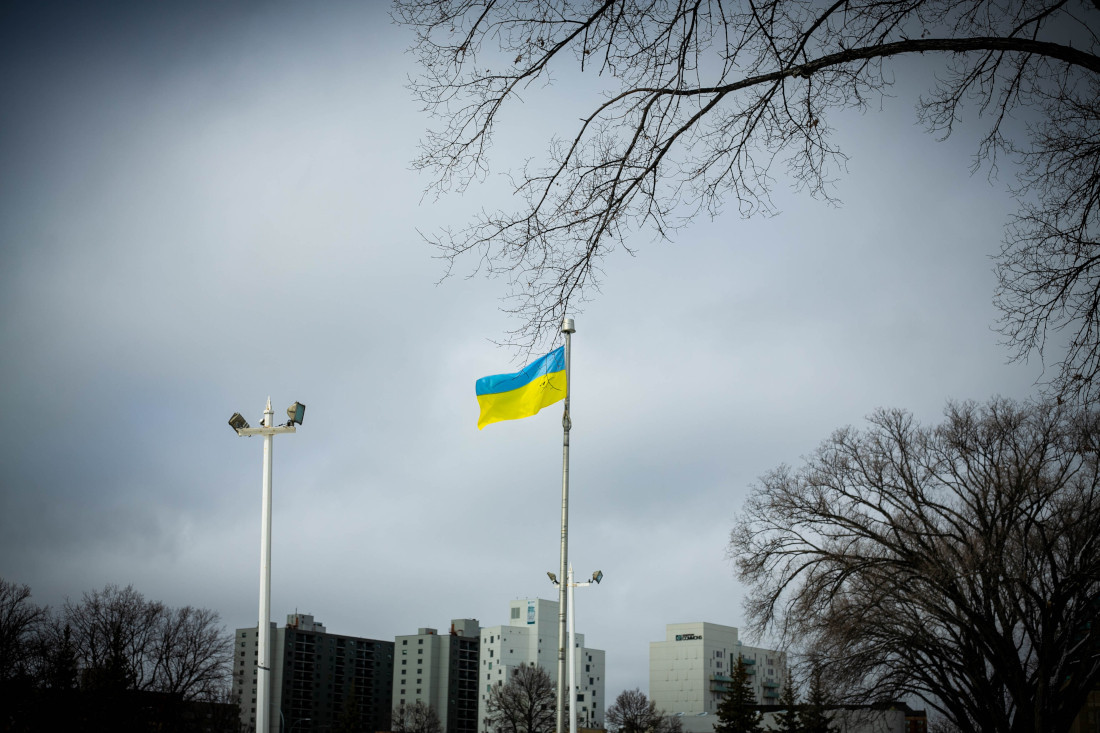Flag-raising and fee-waving
The U of W’s response to the war in Ukraine
A Ukrainian flag was raised in solidarity in Memorial Park in late February. (Supplied photo)
The University of Winnipeg (U of W), located in a province with a large Ukrainian population, has responded to the conflict by issuing a statement of solidarity with Ukraine, as well as providing resources to students.
In a statement on the U of W website, Dr. Jan Stewart, the university’s interim provost and vice-president academic, “calls for an end to Russia’s escalating war against Ukraine.”
“Our thoughts are with Ukrainian people and their family members in Winnipeg and beyond,” she says.
In early March, the U of W raised the Ukrainian flag on campus to show support. While the gesture was surely appreciated, the university has also been trying to do more than symbolic solidarity.
Stewart notes that the university is “in direct contact with current students who are from Ukraine to ensure they are fully supported.” Her statement emphasises that “counselling and health and wellness resources” are available to all students.
Countless studies have shown the negative impact of a conflict such as this one on students in higher education. A UNESCO report found that even “minor shocks” can lead to “significant and long-lasting detrimental effects” on educational attainment. Furthermore, exposure to violence “results in significant gender differentials in individual education outcomes.”
“If you are a student experiencing difficulty with course requirements, we encourage you to reach out to an advisor in Student Services or talk to your instructors,” Stewart says.
U of W has also waived application fees for students coming from Ukraine, which is standard practice for the university when it deals with students from war-affected areas.
“We will continue to monitor and respond to this situation, standing together in support of Ukraine’s fight for independence,” Stewart says.
Anthony Zarow of the U of W Ukrainian Students’ Association (UWUKRSA) says the U of W’s response to this crisis has been “pretty good.”
The UWUKRSA has also been doing what it can to help Ukrainians.
“Our goal right now is to get as much help and resources as possible to Ukraine,” he says. As such, Zarow’s group has made blue and yellow (the colours of the Ukrainian flag) ribbons and sold them, donating the proceeds to the Canada-Ukraine Foundation Humanitarian Appeal.
The UWUKRSA is also advocating for policy changes beyond the university campus. “The main thing that we want right now is all the red tape for refugees to be gone,” Zarow says.
Canada recently announced that Ukrainian refugees will be able to stay here for three years. As of March 26, more than 3.7 million people have fled Ukraine since Feb. 24.
The U of W Ukrainian Students’ Association’s Facebook page is facebook.com/uwukrsa.
Published in Volume 76, Number 23 of The Uniter (March 31, 2022)







